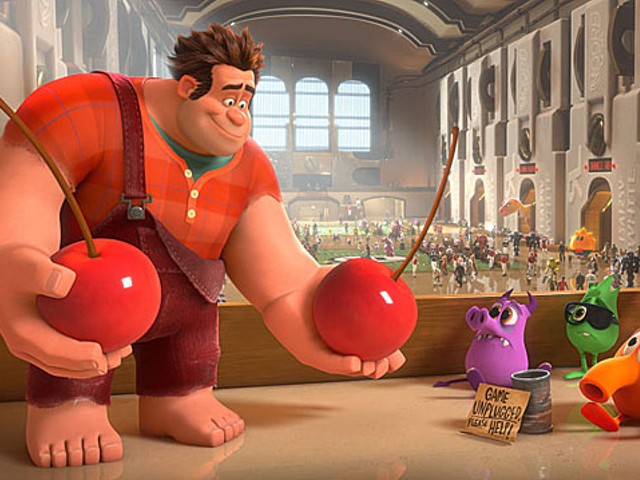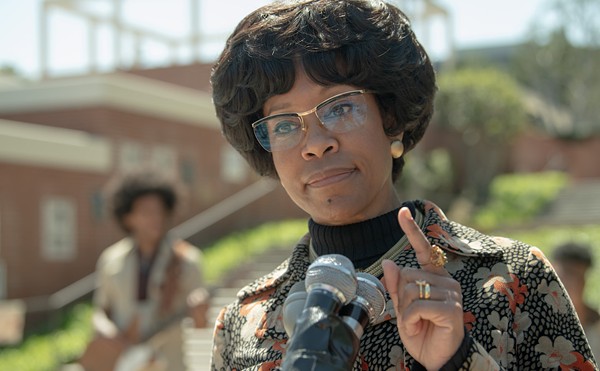When the first St. Louis International Film Festival was held back in April of 1992, movies were way different: projectors were powered by generators powered by yaks, and tickets were chiseled onto concrete slabs, making them all but impossible to tear in half. All right, so maybe things weren't quite so unrecognizable. Then, as now, the fest was committed to bringing us the most interesting, intriguing films to the big screen. But those venues have grown in number to include concert halls (the Sheldon) and universities (Webster and Wash. U.) and newly restored theaters on the other side of the river (the Wildey in Edwardsville), as well as the time-tested, much-loved venues of the Hi-Pointe, the Tivoli, Plaza Frontenac and more. In the early '90s, SLIFF brought with it a few dozen films and awards. These days, it packs in events by the hundreds — docs, shorts, feature films, children's films, musical performances, seminars, Q&As with screenwriters...oh, and did we mention that lots of these events are free? Below, we share a few of the many, many offerings between Friday, November 9, and Wednesday, November 14 (more to come next week). A complete guide to SLIFF events around town and ticket information can be found online at cinemastlouis.org.
Ballplayer: Pelotero. (Not Rated) One of out every five professional baseball players in the U.S. comes from the Dominican Republic. Take a second with that stat. Here's another: Every big-league team runs a baseball academy on the island. Unless you follow baseball, you probably had little idea how important signing young Dominican players is to Major League Baseball. And unless you follow MLB, you probably can't imagine what a mess it has been to make of the whole process. Ballplayer: Pelotero, a documentary narrated by John Leguizamo, follows two of the country's hot prospects of 2009-- shortstops Jean Carlos Batista and Miguel Angel Sano-- in the months leading up to July 2, MLB's "singing day." An unexpectedly gripping portrait of how MLB's sausage gets made, the film pits the frustration of the young players and their families, who see baseball as a way out of poverty, against the inflexibility of MLB, which battles age and identity fraud among players—and which declined to be interviewed for the film. Indeed, one family member calls MLB "a Mafia." A rebuttal might have served the sport well. (Michael Leaverton) 3:30 p.m. Saturday, November 10, at the Tivoli.
Bullhead. (R) In Bullhead, Michael R. Roskam's first feature, thirtyish Jacky (Matthias Schoenaerts) is a cattle-farming hulk who keeps his mini fridge stocked with Testoviron and other steroids. The brute gobbles pills and plunges syringes into his flesh to compensate for what happened 20 years earlier, when young Jacky was gelded by a teenage psychopath, who does to the lad what Charlotte Gainsbourg did to Willem Dafoe in Antichrist. Although a hazily sketched-out story line involving a dead cop, beef traders, and "the hormone Mafia underworld," with which Jacky is loosely connected, propels the movie, it inevitably circles back to his ever-present trauma from this act of savagery (and cues more ill-advised flashbacks). Bullhead, an Oscar contender in the foreign-language-film category, sets out to prove exactly what is spelled out in the opening voiceover: "One thing is certain: You're always fucked." The sentiment, just like the repeated shots of Jacky lying in fetal position in the tub, shadowboxing, and erupting into a bestial 'roid rage, typifies the film's habit of flattening an idea rather than developing it. (Melissa Anderson) 8:45 p.m. Friday, November 9, at Plaza Frontenac.
Found Memories. (Not Rated) There's no electricity in the Brazilian village where Found Memories is set, and trains no longer heat up the tracks. For the remaining dozen or so inhabitants, there is just a kind of ritualized waiting, something director Júlia Murat lingers over for the film's first half-hour or so, depicting seemingly small lives with big, slightly color-faded frames and long takes. In particular, Murat establishes the rhythm of the life of Madalena (Sonia Guedes), an old woman with a strict, mostly silent routine who saves all of her warmth for the letters she writes to her dead husband each night. Found Memories draws the viewer into that rhythm—from pre-dawn bread baking to Madalena's prickly interactions with defunct café owner Antonio (Luiz Serra), to their post-squabble coffee and mass—so that when a young woman appears on Madalena's doorstep, she seems to have entered this suspended world along with us. Rita (Lisa E. Fávero) is a backpacking photographer in search of aesthetic bliss. Initially treated like the parasite she appears to be, over the course of this crisp, gracefully inflected meditation on time's passage, Rita develops the interest in her subjects that turns an image into more than stolen light. (Michelle Orange) 2 p.m. Monday, November 12, at Plaza Frontenac.
Grassroots. (R) You can tell outsiders from the establishment by the quality of their facial hair in Grassroots, an adaptation of Phil Campbell's nonfiction book about scruffy Grant Cogswell's (Joel David Moore) upstart July 2001 campaign-- managed by scraggly bearded ex-reporter Campbell (Jason Biggs-- to unseat the dapper, mustached Richard McIver (Cedric the Entertainer) on Seattle's city council. Director Stephen Gyllenhaal, despite celebrating by-the-people activism (which apparently involves lots of heavy metal and vandalism), hews to a rather standard us-versus-them template. Gyllenhaal's shaky-cam cinematography doesn't amplify the material's DIY spirit, and both Biggs and Moore argue, preach, and ramble on with affected fervor. Meanwhile, by ultimately softening its stance toward McIver, Grassroots disingenuously has it both ways, reducing politics first to a David-versus-Goliath adventure, and then to an everyone-is-cool bowl of mush. (Schager) 8:45 p.m. Saturday, November 10, at Plaza Frontenac.
Hipsters. (Not Rated) "Every hipster is a potential criminal," warns a student communist in Valeriy Todorovskiy's musical period piece. These "hipsters" are, in style and substance, the polar opposite of today's artfully disheveled gentrifiers: In a post-war Moscow where consuming Western products is considered a form of treason, their insouciant fetishization — and charming lost-in-translation misinterpretation — of American jazz culture is a legitimate form of political rebellion. This punch-drunk, decadently designed slice of eye candy loosely traces a year in the life of sexually repressed, socially oppressed baby-faced Mels (Anton Shagin), a gray-suited Young Communist League deputy who shifts allegiance when he falls in love with "real cool chick" Polly (Oksana Akinshina). Although a few of the film's musical numbers are framed around Mels's budding career as a jazzman and the gang's nightly rendezvous at underground club The Pompadour (where they live out the fantasy of, as one lyric tells it, "strolling down Broadway, leaving all those miserable squares behind"), many explode in full choreographed splendor out of ordinary spaces (a classroom, the shared hallway of a communal tenement), splitting the difference between sexually charged fantasy and historically haunted reality and boldly defying narrative convention. The closing number, in which Mels and Polly finally get to stroll down a Broadway that only exists in their dreams, is both hilariously absurd and rousing, an unironic swoon at the notion of any subculture as a form of inclusive resistance. (Karina Longworth) 9:30 p.m. Monday, November 12, at the Hi-Pointe.
It's Such a Beautiful Day. (Not Rated) It made for a deceptively vital change of context when cult animator Don Hertzfeldt strung together four of his award-winning cartoons into the feature-length portmanteau It's a Beautiful Day. Continuity is key to these shorts, which collectively create a heroic epic out of the violent hallucinatory memories and daydreams of Bill, a depressive and possibly fatally ill stick figure. Bill's attempts to process his pain and the inexplicable minutiae of his daily routine allow Hertzfeldt to examine both traumatizing fears of death and the absurd joy of life. Bill thinks about bacteria-infested crotches at the supermarket, sees a dead bird besieged by ants on the sidewalk, passes out with alarming regularity, and remembers the past lives of family members, like the younger, hook-handed brother who died chasing a seagull. And as Bizet, Schumann, Rachmaninoff, and Wagner swell on the soundtrack, and Hertzfeldt's omniscient but probably not omnipotent narrator lays out events, Bill's life alternatively shrinks and expands to individual moments that collapse into one another. Warped keyhole-size images stack atop one another in a Frankenstein-ian collage that evokes the films of Terrence Malick, David Lynch, Stan Brakhage, and Bruce Conner. Seeing "the years [slip] out of [Bill's] head" in this 71-minute compendium is nothing short of revelatory. (Simon Abrams) 7 p.m. Tuesday, November 13, at Webster's Moore Auditorium.
Klown. (R) Raunchy dude comedy is hardly the sole province of American cinema, as Klown all too dispiritingly reconfirms. Based on his popular Danish TV series, director Mikkel Norgaard's film is a road trip comedy of a familiar male-centric sort in which the canoeing expedition of buffoonish Frank (Frank Hvam) and horndog Casper (Casper Christensen)-- dubbed "the Tour de Pussy" by the latter-- is complicated by Frank's decision to bring along his 13-year-old nephew Bo (Marcuz Jess Petersen) in order to prove his father potential to pregnant girlfriend Mia (Mia Lyhne). The ensuing mayhem's gender dynamics are rote, with women as grating commitment harpies or whores and men as deviant scumbags or naive goofs. Following its chosen genre's bylaws, virtually every humorous set piece manages to involve male genitalia, be it a running thread about Bo's tiny weenie or ladies' man Casper's covert fondness for the same sex. Given its vulgar bro-ness, it's no surprise that The Hangover's Todd Phillips will be overseeing the inevitable American remake. (Schager) 9:30 p.m. Monday, November 12, at Plaza Frontenac.
A Late Quartet. (R) Woody Allen has been known to suggest that, in directing a good movie, much of the battle lies in casting. Were that entirely true, the Philip Seymour Hoffman–, Catherine Keener–, and Christopher Walken–starring A Late Quartet would be phenomenal. As it is, the film about a New York City string quartet whose future is thrown into question after the cellist (Walken) is diagnosed with Parkinson's disease and the two married members' relationship (Keener and Hoffman) begins to unravel is a mixed bag. Always stately, occasionally stuffy, co-writer/director Yaron Zilberman's chamber drama expresses every real-world problem via musical metaphors and is prone to occasional bouts of grandiosity not quite befitting its stripped-down scale. This tonal back-and-forth is in some ways reflective of the group's music but impedes us from getting a meaningful hold on what these people are feeling and why we should care. Zilberman is often too tasteful to dig into the scandal and melodrama that eventually mires A Late Quartet's plot, but an exceptional finale bucks this trend by acting more as a catharsis than a climax, making up for prior shortcomings and fulfilling much of the film's promise. It's something of a relief that little is actually resolved in A Late Quartet; Zilberman is at his best when leaving narrative threads hanging rather than trying to tie them together. (Nordine) 7 p.m. Friday, November 9, at the Hi-Pointe.
Teddy Bear. (Not Rated) A Danish character study of a bachelor bodybuilder living outside of Copenhagen with his mother, director Mads Matthiesen's Teddy Bear emphasizes muscle mass as an agent of isolation, a padding that keeps the world away. Thirty-eight-year-old competitive bodybuilder Dennis, played by Kim Kold, is introduced on a zero-chemistry date, grasping for straws. One wonders how any man could approach middle age and be so totally hapless with women. The question is immediately resolved when Dennis comes home to his mother, Ingrid (Elsebeth Steentoft), a white-haired, slightly wraithlike woman with ramrod-straight posture who waits up on her son and grills him on his whereabouts like a jealous lover. Aside from his towering, enveloping mass, Kold has an eloquently open face. Dennis's downcast eyes broadcast his inchoate desire for companionship so clearly that only his mother could possibly miss it, blind to everything but the dictates of her maternal covetousness, her frail frame seemingly wasted away by the intensity of her need. Through Matthiesen's felicitous selection of telling details, we quickly comprehend that the absolute boundaries of Dennis's life are home and the gym, where we see him smile for the first time, greeting the image of his flexing body in the mirror. Matthiesen adheres to contemporary Eurozone realism and Dennis's POV, self-imposed limitations that prevent Teddy Bear from having the breadth of a great work, while they give it the coherence of a good tale, simply told. (Pinkerton) 9:30 p.m. Sunday, November 11, at Plaza Frontenac.
This Is Not a Film. (Not Rated) In 2010, internationally celebrated Iranian filmmaker Jafar Panahi was arrested at his home and sentenced to six years in prison for "[participating] in a gathering and carrying out propaganda against the system." The sentence included a 20-year ban on directing and writing films, giving press interviews, and leaving Iran. Billed as "an effort by Jafar Panahi and Mojtaba Mirtahmasb," This Is Not a Film was shot entirely on the grounds of Panahi's Tehran apartment in March 2011 while Panahi was under house arrest. It's a dispatch from Panahi's life behind closed doors. In its most thrilling sequence, we see Panahi brainstorm ways to express himself using his filmmaking talents without actually violating the ban against filmmaking itself. But after excitedly reading aloud and blocking out a screenplay's first scene, Panahi's enthusiasm wanes. "If we could tell a film, why make a film?" he frets. If "why make a film?" is one question that haunts This Is Not a Film, "what is film?" is the inevitable follow-up. The title is a literal description of methodµshot on a video camera and iPhone, this "effort" could only exist in a digital age. This is pointedly not cinema, but it's breathtakingly cinematic. It's a political statement, an act of defiance, a master class in one auteur's body of work and process, and a document of a life unseen. But above all, it's a gripping entertainment, swinging wildly from manic highs to somber lows, every moment of levity shadowed by anxiety. (Longworth) 9 p.m. Tuesday, November 13, at Plaza Frontenac.
Three Stars. (Not Rated) When you're trying to figure out what to eat, it's completely natural to tap your upper lip, gaze off into space, and say, "I wonder what a company that manufactures high-performance tires would recommend?" But who are you going to ask? Firestone?! Please. And Goodyear gave Guy Fieri's Tex Wasabi restaurant five whole stars. Serious gourmands who also demand superior rolling resistance and gripping power on slick roads have always relied on Michelin for braking, handling, and reliable starred restaurant reviews. Lutz Hachmeister's 2010 film Three Stars documents nine restaurants in seven countries, all of which boast three stars in the Michelin Guide, and examines what that rating means to diners and how it influences chefs and owners in the evolution of their businesses. Do you become more adventurous? Or maintain the status quo for which you were cited in the guide? The film captures the thin membrane separating the theatricality with which patrons are treated in the dining rooms from the chaos, noise, and impressive culinary heroics in the kitchens. Unlike reality shows such as your Kitchen Nightmares, Three Stars maintains narrative distance from its subjects, who are actually documented, rather than encouraged toward professional histrionics. But Hachmeister's understatement results in a narrative plateau somewhere in the last third of the film, and viewers who showed up hungry may become impatient. (Packham) 4:30 p.m. Sunday, November 11, at the Wildey.






